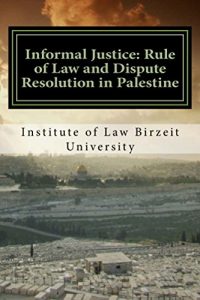The Palestinian Legal System is often characterized as complex, since it consists of different layers of colonial codes and rules: Ottoman, British, Jordanian, and Egyptian laws, Israeli military orders and Palestinian legislation. Complicating matters further, there are at least two segments of legal and judicial life that coexist in Palestine:1 Codified laws and regulations, which include the religious laws (i.e. Sharia), and an informal system of conflict resolution based on customs (urf).
The term ‘informal justice’ refers to a social phenomenon widespread throughout the West Bank, East Jerusalem and Gaza Strip, comprising the settlement of disputes between citizens outside the framework of the regular or formal (nizami) courts. It is a phenomenon which exists in a number of Arab countries.
The book presents a deep socio-legal investigation and places legal and tribal practices in the general social context. It also strives to understand the social logic and general principles that govern informal justice and to explain the reasons for continued use of the system. It therefore does not start off from a position that simply emphasizes the need for an official unified legal system that guarantees the rule of law, however imperative this is; rather, it is based on the principle that positions and recommendations must be based on a detailed understanding of the way informal justice works in real life, through the actions and positions of real social actors (ordinary people, formal and informal actors).
The book provides a chronology of public institutions produced by the various regimes which have exerted their sovereignty on Palestine. The chronology allows the non specialist reader to understand the evolution of the system through those periods until the establishment of the Palestinian Authority and effect of the Israeli occupation on the system.
The researchers involved in the study used field research to disclose the extent of the relationship and interaction between informal justice and the various social sectors and their institutions. This was included in–depth interviews with actors connected to informal justice; it also included collecting relevant documents from the different areas in the West Bank, East Jerusalem and Gaza.
The book points to ingenious distinctions and contradictions between collective and individual approaches of law and rights when dealing at the same time with informal and official justice and by introducing a dose of political philosophy in the socio-legal approach, the researchers of the study draw the readers’ attention on sensitive issues dealt with in Palestine today and challenge traditional perceptions on the nature of the rule of law and building state institutions in a conflict situation.
The term ‘informal justice’ refers to a social phenomenon widespread throughout the West Bank, East Jerusalem and Gaza Strip, comprising the settlement of disputes between citizens outside the framework of the regular or formal (nizami) courts. It is a phenomenon which exists in a number of Arab countries.
The book presents a deep socio-legal investigation and places legal and tribal practices in the general social context. It also strives to understand the social logic and general principles that govern informal justice and to explain the reasons for continued use of the system. It therefore does not start off from a position that simply emphasizes the need for an official unified legal system that guarantees the rule of law, however imperative this is; rather, it is based on the principle that positions and recommendations must be based on a detailed understanding of the way informal justice works in real life, through the actions and positions of real social actors (ordinary people, formal and informal actors).
The book provides a chronology of public institutions produced by the various regimes which have exerted their sovereignty on Palestine. The chronology allows the non specialist reader to understand the evolution of the system through those periods until the establishment of the Palestinian Authority and effect of the Israeli occupation on the system.
The researchers involved in the study used field research to disclose the extent of the relationship and interaction between informal justice and the various social sectors and their institutions. This was included in–depth interviews with actors connected to informal justice; it also included collecting relevant documents from the different areas in the West Bank, East Jerusalem and Gaza.
The book points to ingenious distinctions and contradictions between collective and individual approaches of law and rights when dealing at the same time with informal and official justice and by introducing a dose of political philosophy in the socio-legal approach, the researchers of the study draw the readers’ attention on sensitive issues dealt with in Palestine today and challenge traditional perceptions on the nature of the rule of law and building state institutions in a conflict situation.












